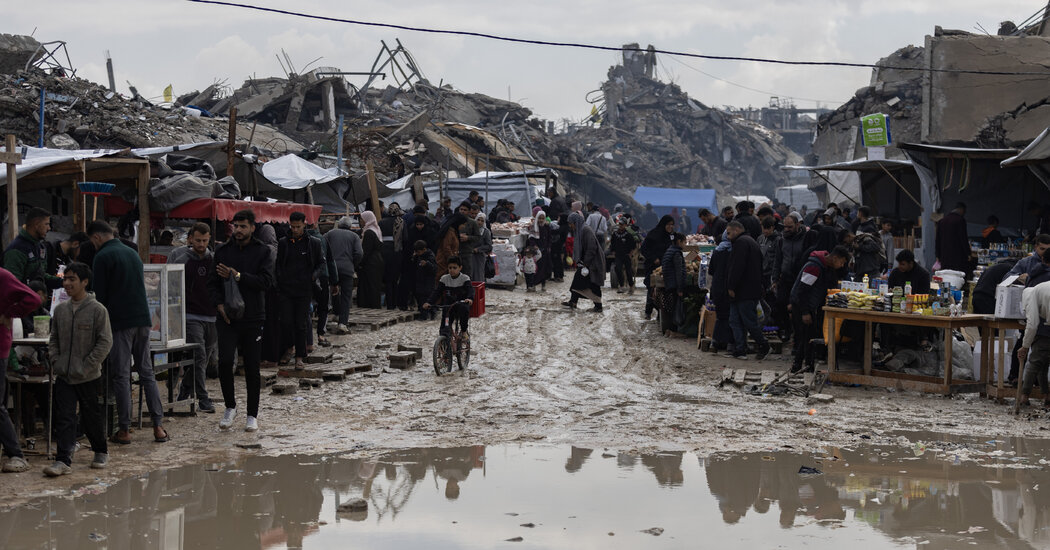The leaders of Gulf Arab states met on Friday to strategize with their Egyptian and Jordanian counterparts in an effort to counter President Trump’s controversial proposal to redevelop Gaza under U.S. control and displace its Palestinian residents.
The meeting in the Saudi capital, Riyadh, was in preparation for a broader Arab League summit in Egypt on March 4. It ended after several hours without any official statement of what was discussed or decided.
Mr. Trump’s suggestion this month that the United States might take control of Gaza, develop it into the “Riviera of the Middle East” and relocate its Palestinian residents to neighboring countries like Egypt and Jordan was met with astonishment and outrage across the Arab world. His aides then reframed it as a challenge to leaders of the Middle East to come up with a better alternative.
“All these countries say how much they care about the Palestinians,” Secretary of State Marco Rubio said last week. “If the Arab countries have a better plan, then that’s great.”
Then, Arab governments scrambled to come up with one.
Mr. Trump said on Friday that he did intend to impose his Gaza plan on anyone.
“I’m not forcing it. I’m just going to sit back and recommend it, and then the U.S. would own the site,” he said in an interview with Fox News Radio. “There’d be no Hamas and it would be developed, and you’d start all over again with a clean plate.”
Egypt, Jordan, Saudi Arabia, Qatar and the United Arab Emirates have been working together to forge an alternative idea for Gaza in which Arab countries would help fund and oversee reconstruction, while keeping the two million Palestinian residents in place and preserving the possibility of a Palestinian state, according to diplomats and officials briefed on the efforts.
But a key sticking point remained the question of postwar governance in Gaza.
A proposed Egyptian plan would most likely include the formation of a committee of Palestinian technocrats and community leaders, all unaffiliated with Hamas, who could run Gaza after the war.
But Israeli leaders have said they would oppose any postwar plans that would pave the way to Palestinian sovereignty. Arab leaders insist they would support only a proposal that at least nominally forged a path toward Palestinian statehood.
For any Arab strategy on the governance of Gaza, the Arab leaders would want the blessing of the Palestinian Authority, the internationally recognized body that administered Gaza until Hamas wrested control of the territory nearly two decades ago.
But the authority’s president, Mahmoud Abbas, has appeared wary of any plan that does not give him full control of Gaza. Mr. Abbas did not attend Friday’s talks, according to an official photograph of the leaders released by the Jordanian royal court.
Hamas officials have said they would be willing to cede control over civilian affairs to another power but have refused so far to say they would disband their military wing, an unacceptable position for both Israel and Mr. Trump.
Members of the Gulf Cooperation Council attended the meeting in Riyadh along with Egypt’s president, Abdel Fattah el-Sisi, and King Abdullah of Jordan. The Egyptian leader arrived in Riyadh on Thursday for preliminary talks with the Saudi crown prince, Mohammed bin Salman.
Speaking to reporters on Wednesday before his departure for Saudi Arabia, Mr. el-Sisi reinforced the idea that Egypt’s proposals would “not involve forcible displacement” of Palestinians.
The Arab plan will focus on ideas that keep Palestinians inside Gaza to counter Mr. Trump call’s for Egypt and Jordan to take them in, an idea Arab countries have all rejected. Many in the Arab world would consider any forced displacement of Palestinians from Gaza an ethnic cleansing and a war crime as well as a death knell for any future Palestinian state.
Some countries, like Jordan and Egypt, might also be concerned that increased Palestinian migration could create economic and political disruptions at home.
There have been a number of other audacious plans floated for the day after in Gaza, but none have really gained traction. The latest one came from Khalaf al-Habtoor, a billionaire Emirati real estate magnate, who offered an ambitious blueprint aimed at rebuilding the enclave within a “matter of years, not decades.”
His proposal would begin with the construction of 500,000 prefabricated units as temporary housing for displaced people in southern Gaza. The ambitious plan would cost an estimated $2 billion for an initial phase that he envisions would be financed by the governments of United Arab Emirates, Qatar, Saudi Arabia and Kuwait, should they accept his proposal.
It would cost more than $50 billion to rebuild Gaza after nearly 16 months of the war, according to an assessment released by the United Nations, the European Union and the World Bank this week.
Any plan for Gaza will also need to take into account the need to prevent future attacks on Israel. There are also the questions of who would pay for reconstruction and whether Arab countries would send forces to keep Gaza stable.
While Egypt has yet to release full details of its proposal, Prime Minister Mostafa Madbouly said on Wednesday that Cairo was working on a comprehensive plan for Gaza’s reconstruction that envisioned restoring the enclave within three years, according to Ahram Online, an Egyptian state-run news outlet.
Riyadh has been playing a crucial diplomatic role this week, hosting U.S., Russian and Arab officials for high-stakes talks on the wars in both Ukraine and Gaza.
Vivian Yee contributed reporting from Cairo.


